This year’s Olympic Games (Paris 2024) was quite controversial from start to finish as it kept sending paradoxical cues to the audience and its participants. From its opening ceremony to the doping suspensions, to alleged trans athletes participating in regular categories, to witchcraft themed performances, to its closing ceremony.
There’s definitely a lot to unpack but what was most painful for us was the fact that Nigeria had no medals this year after all our athletes went through in order to participate in the games, given the huge amount of money that was invested by the FG.
While the outcome of events in this year’s Olympic games might be less than desirable, we have quite a number of Nigerian athletes that have done us proud at previous Olympic games and they don’t get enough accolades. Let’s shine the spotlight on a few of them as we focus on Nigerian Olympians that you probably never knew
Chioma Ajunwa-Opara
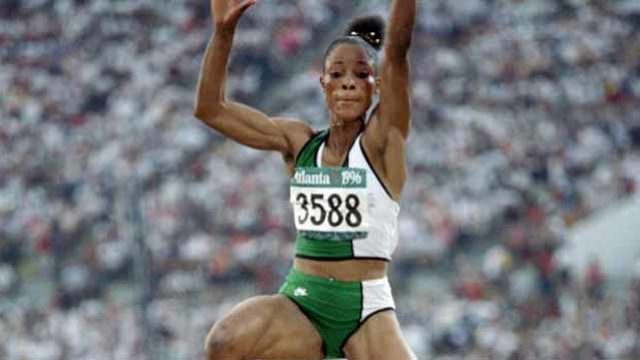
Chioma Ajunwa, MON, OLY (born 25 December 1970) is a Nigerian former track and field athlete and football player. She started out as a football player and she played as an attacker for the Nigerian women’s team (The Falcons) during the Women’s World Cup in 1991, but she claims she was constantly benched, and her skills weren’t put to good use, so she decided to focus on being a track and field athlete.
As a track and field athlete, Chioma specialized in the 100m, 200m and long jump. She competed at the 1990 Commonwealth Games, winning a bronze medal in the 4 x 100 metres relay, and competed at the African Championships in 1989 and the All Africa Games in 1991 where she won gold medals in the long jump. She was banned from the sport for four years after failing a drug test in 1992, despite maintaining her innocence.
After completing the suspension, she went on to become the first West-African woman, as well as the first Nigerian, to win an Olympic gold medal in a track and field event when she emerged victorious in the women’s long jump event at the 1996 Olympics in Atlanta, with a jump length of 7.12 meters (on her first attempt) during the final.
She currently serves as a member of the Nigerian Police Force. Chioma remains the only woman to have competed at both the FIFA Women’s World Cup as a footballer and the Olympics as a track and field athlete.
In December 2017, she launched the Chioma Ajunwa-Okpara Foundation to discover new Nigerian stars in sports. The Foundation, in collaboration with the Abia State government, sponsored an Under-16 Athletics Championship for Secondary Schools in March 2018.
Emmanuel Arinze Ifeajuna
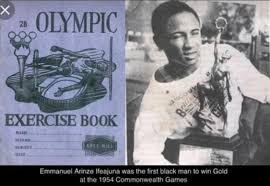
Emmanuel Arinze Ifeajuna was a Nigerian army major and high jumper. He trained in the high jump under his games teacher and the 1954 Nigerian Athletics Championships saw him establish himself among the nation’s best high jumpers.
A jump of 6 feet 5.5 inches (1.97 m) meant Ifeajuna was chosen to represent his country at the 1954 British Empire and Commonwealth Games, alongside Nafiu Osagie.
At the 1954 Games in Vancouver, he competed wearing only his left shoe yet managed to clear 6 ft 8 in (2.03 m), which was both a Games record and a British Empire record for the discipline.
The resulting gold medal made him the first Black African to win at a major international sports competition. The high jump had an African sweep of the medals that year, with Uganda’s Patrick Etolu finishing behind Ifeajuna and Nigeria’s Osagie taking third place.
Ifeajuna received a hero’s welcome upon his return to Lagos and was paraded through the streets before speaking at a civic celebration.
He later joined the military and played a role in the 1966 Nigerian coup d’état.
Nojim Maiyegun
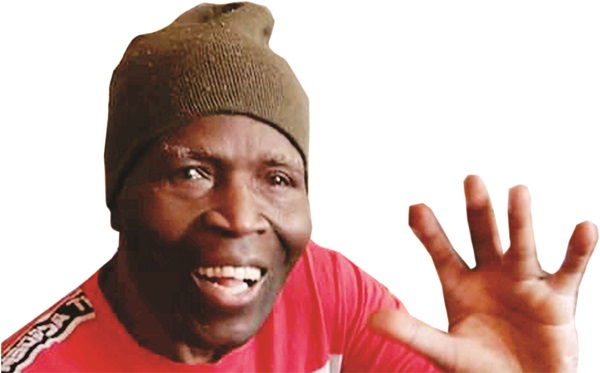
Nojim Maiyegun (born 17 February 1941 in Lagos) is a retired Nigerian boxer, who won the bronze medal in the men’s Light Middleweight (71 kg) category at the 1964 Summer Olympics in Tokyo, Japan.
He was Nigeria’s first Olympic medalist. He revealed his loss of vision in 2012.
Falilat Ogunkoya-Osheku (The Gold Medalist)
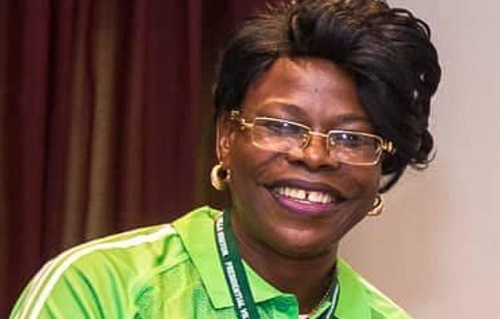
Born on the 5th of December 1968 in Ode Lemo, Ogun State, Nigeria. Falilat is a Nigerian former track and field athlete who holds the distinction of becoming the first Nigerian to win an individual track and field medal at the Olympic games.
She has won quite a number of national championships, including a gold medal in 1996 in the 400 metres, gold in the 200 metres and 400 m in 1998, and gold again in 1999 and 2001 in the 400m. At the 1987 All Africa Games in Nairobi she won the silver medal in the 200m. In 1995 at the All Africa Games in Harare she won the silver in the 400m, and at the 1999 Games in Johannesburg she won a gold medal in the 400m.
At the 1996 Summer Olympics Ogunkoya won a bronze medal in the 400m, in a personal best and African record of 49.10, which is currently the twelfth fastest of all time. It marked the first time a Nigerian athlete won a medal in an individual track and field event.
Chika Yagazie Chukwumerije
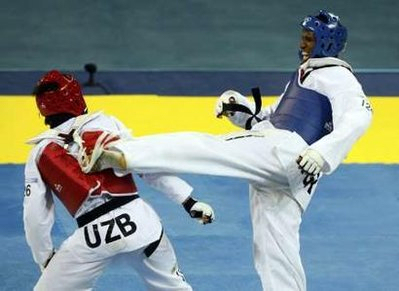
Chika is a male taekwondo practitioner from Nigeria. The son of Nigerian politician Uche Chukwumerije. Chika first drew attention in 2003 during the qualifiers for the 2003 All-Africa Games, where he eventually won a bronze medal in the Heavyweight Male category. He qualified for the 2004 Summer Olympics in Athens, but lost his first bout to Pascal Gentil, the eventual bronze medal winner.
Nevertheless, after a period of intensive training, he became one of Nigeria’s best chances for a medal at the 2008 Summer Olympics in Beijing. He won a gold medal at the 2007 All-Africa Games in the +80 kg class and qualified for the 2008 Olympic Games soon after.
Although he lost to eventual silver-medal winner Alexandros Nikolaidis in the semifinals of the +80kg event, he was entered into the repechage round of the tournament. Here, after defeating Akmal Irgashev of Uzbekistan he claimed a bronze medal in the event, Nigeria’s third medal of the tournament. Four years later he competed at the 2012 Summer Olympics, but did not make it past his first bout.
As I stated earlier, there are several athletes that have done Nigeria proud in times past that didn’t make this list. I feel like they don’t get enough recognition, especially once they’re out of the spotlight. This is our way of giving them their flowers.
You can also join us in doing so by tagging any Nigerian athlete you know and @myfusionapp across social media and dropping nice comments on their profile. Let’s go!

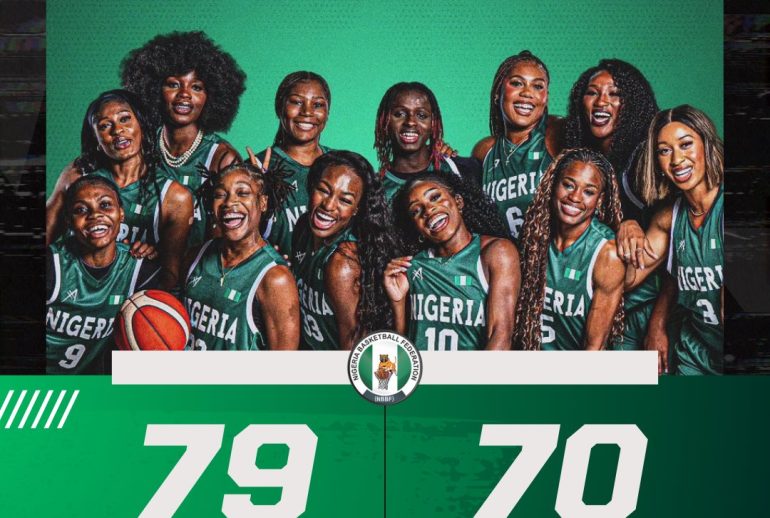


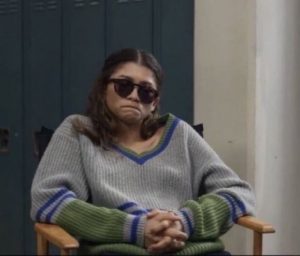

300 Responses
purchase cialis online: TadalAccess – buy voucher for cialis daily online
is there a generic cialis available? Tadal Access what is the use of tadalafil tablets
cialis tadalafil cialis experience cialis pills for sale
https://tadalaccess.com/# cialis when to take
https://tadalaccess.com/# buy liquid tadalafil online
cialis free trial canada TadalAccess best time to take cialis 5mg
verified facebook business manager for sale https://buy-business-manager-acc.org/
tadalafil citrate liquid: cialis super active plus – cialis para que sirve
cialis 800 black canada cialis dapoxetine sildenafil and tadalafil
verified bm for sale https://buy-bm-account.org/
cialis canada prices: TadalAccess – order cialis online no prescription reviews
cialis com coupons: cialis using paypal in australia – best place to buy liquid tadalafil
Your point of view caught my eye and was very interesting. Thanks. I have a question for you.
buying cialis online usa: Tadal Access – vigra vs cialis
cialis for performance anxiety: TadalAccess – cialis timing
tadacip tadalafil: order cialis online – cost of cialis for daily use
tadalafil 40 mg india: Tadal Access – where to buy cialis soft tabs
facebook bm for sale https://business-manager-for-sale.org
buy facebook verified business account facebook bm account buy
tadalafil citrate powder: TadalAccess – buy cialis by paypal
cialis 5mg coupon: TadalAccess – is tadalafil available at cvs
tadalafil lowest price Tadal Access cialis on sale
https://tadalaccess.com/# cialis walmart
cheap cialis 20mg cialis online paypal best price for tadalafil
cialis priligy online australia: Tadal Access – buy generic cialiss
cialis 20mg for sale TadalAccess buy tadalafil online paypal
buy cialis without doctor prescription cialis headache cialis side effects a wife’s perspective
tiktok ads account for sale https://tiktok-ads-account-buy.org
do you need a prescription for cialis: Tadal Access – tadalafil generic in usa
prices of cialis 20 mg: TadalAccess – cialis not working
cialis free trial voucher TadalAccess when does cialis patent expire
https://tadalaccess.com/# free coupon for cialis
tiktok ads agency account https://tiktok-agency-account-for-sale.org
https://tadalaccess.com/# pregnancy category for tadalafil
what is the cost of cialis: TadalAccess – cialis and high blood pressure
compounded tadalafil troche life span Tadal Access cialis manufacturer coupon
online tadalafil Tadal Access tadalafil (tadalis-ajanta)
https://tadalaccess.com/# canadian pharmacy ezzz cialis
is tadalafil peptide safe to take: TadalAccess – difference between sildenafil and tadalafil
cialis price TadalAccess purchasing cialis
https://tadalaccess.com/# cialis dapoxetine australia
cialis once a day cialis company cialis 10mg ireland
cialis generics: reddit cialis – cialis for prostate
cialis generic 20 mg 30 pills Tadal Access when does cialis go off patent
combitic global caplet pvt ltd tadalafil Tadal Access cialis prices in mexico
tadalafil review forum: Tadal Access – side effects of cialis tadalafil
cialis tadalafil 20 mg Tadal Access achats produit tadalafil pour femme en ligne
https://tadalaccess.com/# cialis alcohol
cialis discount coupons Tadal Access canadian cialis no prescription
https://tadalaccess.com/# cialis side effects forum